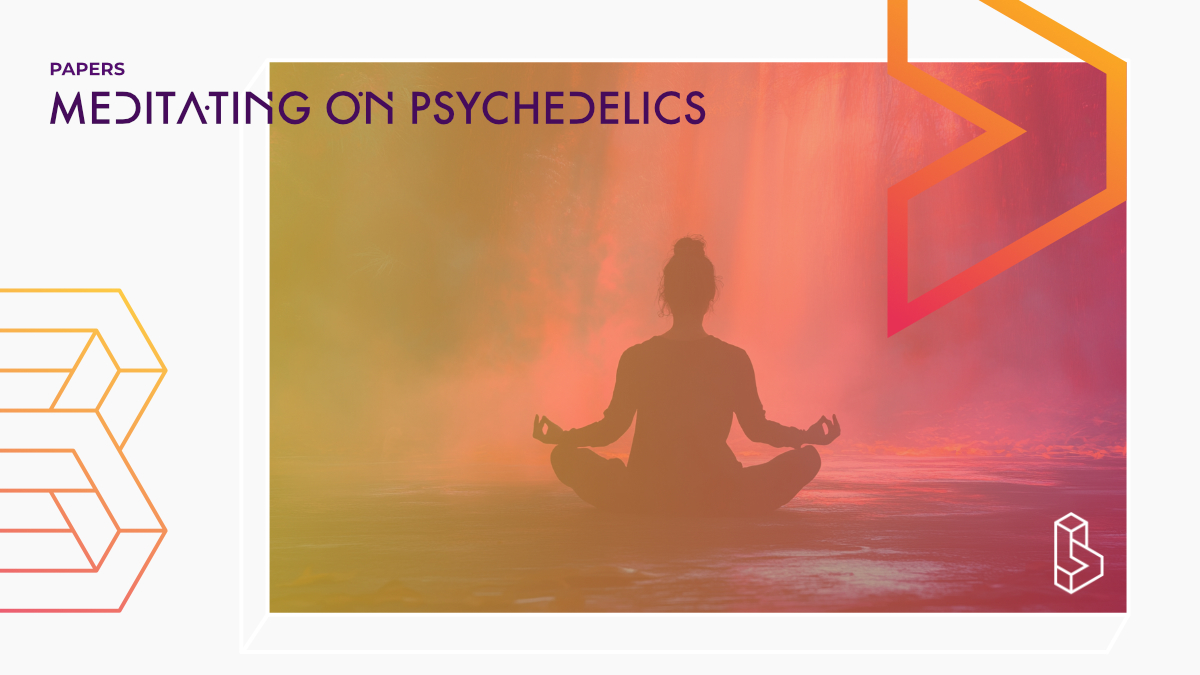This double-blind, placebo-controlled study (n=40) investigates the effect of DMT-harmine (‘pharmahuasca’) on meditative states during a 3-day retreat with experienced meditators. It finds that participants who received DMT-harmine reported greater mystical-type experiences, non-dual awareness, and emotional breakthrough during acute effects, as well as greater psychological insight one day later, compared to the placebo group.
Abstract Meditating on psychedelics. A randomized placebo-controlled study of DMT and harmine in a mindfulness retreat
“Background In recent years, both meditation and psychedelics have attracted rapidly increasing scientific interest. While the current state of evidence suggests the promising potential of psychedelics, such as psilocybin, to enhance meditative training, it remains equivocal whether these effects are specifically bound to psilocybin or if other classical psychedelics might show synergistic effects with meditation practice. One particularly promising candidate is N,N-dimethyltryptamine (DMT), an active ingredient of ayahuasca.
Aim This study aims to investigate the effect of the psychedelic substance DMT, combined with the monoamine oxidase inhibitor harmine (DMT-harmine), on meditative states, compared to meditation with a placebo.
Method Forty experienced meditators (18 females and 22 males) participated in a double-blind, placebo-controlled study over a 3-day meditation retreat, receiving either placebo or DMT-harmine. Participants’ levels of mindfulness, compassion, insight, and transcendence were assessed before, during, and after the meditation group retreat, using psychometric questionnaires.
Results Compared to meditation with a placebo, meditators who received DMT and harmine self-attributed greater levels of mystical-type experiences, non-dual awareness, and emotional breakthrough during the acute substance effects and, when corrected for baseline differences, greater psychological insight 1 day later. Mindfulness and compassion were not significantly different in the DMT-harmine group compared to placebo. At 1-month follow-up, the meditators who received DMT and harmine rated their experience as significantly more personally meaningful, spiritually significant, and well-being-enhancing than the meditators who received placebo.
Conclusion Investigating the impact of DMT-harmine on meditators in a naturalistic mindfulness group retreat, this placebo-controlled study highlights the specific effects of psychedelics during meditation.“
Authors: Daniel Meling, Klemens Egger, Helena D. Aicher, Javier Jareño Redondo, Jovin Mueller, Joëlle Dornbierer, Elijah Temperli, Emilia A. Vasella, Luzia Caflisch, David J. Pfeiffer, Jonas T. T. Schlomberg, John W. Smallridge, Dario A. Dornbierer & Milan Scheidegger
Summary of Meditating on psychedelics. A randomized placebo-controlled study of DMT and harmine in a mindfulness retreat
In recent years, meditation and psychedelics have attracted growing scientific interest, with each practice demonstrating potential benefits for mental health and well-being. Meditation is understood as mental training aimed at enhancing attention, emotional regulation, and self-awareness, while psychedelics like DMT, psilocybin, and ayahuasca induce altered states of consciousness, often providing profound psychological and spiritual insights. Previous research has shown that combining psychedelics with meditation can enhance mindfulness and self-awareness, particularly through mystical-type experiences. The current study investigates the synergistic effects of N,N-dimethyltryptamine (DMT), in combination with harmine, on meditation outcomes. Harmine is a monoamine oxidase inhibitor that prolongs DMT’s psychoactive effects, similar to ayahuasca.
This study explores whether combining DMT-harmine with meditation amplifies meditative states such as mindfulness, compassion, insight, and transcendence beyond what is achieved through meditation alone. Although previous research has focused on psilocybin’s ability to enhance meditation, this study is among the first to examine DMT-harmine in a similar context.
Methods
Participants
Find this paper
https://doi.org/10.1177/02698811241282637
Open Access | Google Scholar | Backup | 🕊
Cite this paper (APA)
Meling, D., Egger, K., Aicher, H. D., Jareño Redondo, J., Mueller, J., Dornbierer, J., ... & Scheidegger, M. (2024). Meditating on psychedelics. A randomized placebo-controlled study of DMT and harmine in a mindfulness retreat. Journal of Psychopharmacology, 02698811241282637.
Study details
Compounds studied
Ayahuasca
Topics studied
Healthy Subjects
Study characteristics
Original
Placebo-Controlled
Double-Blind
Participants
40
Humans
Institutes
Institutes associated with this publication
University of ZurichWithin the Department of Psychiatry, Psychotherapy and Psychosomatics at the University of Zurich, Dr Mialn Scheidegger is leading team conducting psychedelic research and therapy development.
Compound Details
The psychedelics given at which dose and how many times
Ayahuasca 120 mg | 1xLinked Research Papers
Notable research papers that build on or are influenced by this paper
Meditation, psychedelics, and brain connectivity: A randomized controlled resting-state fMRI study of N,N-dimethyltryptamine and harmine in a meditation retreatThis secondary analysis of an RCT fMRI study (n=40) of meditation practitioners during a 3-day retreat found that DMT-harmine ('pharmahuasca', 120mg/120mg buccal) increased functional connectivity within the visual network and between visual and attention networks, whilst meditation alone reduced between-network connectivity, with no evidence of prolonged cortical gradient disruption characteristic of acute psychedelic effects, suggesting distinct neural mechanisms for meditation versus psychedelic-augmented meditation.
Linked Clinical Trial
Mindfulness and PsychedelicsThis double-blind, placebo-controlled trial (n=40) aims to investigate the potential neurophysiological synergy effects between mindfulness meditation and psychedelics, particularly Ayahuasca, on experienced meditators.

